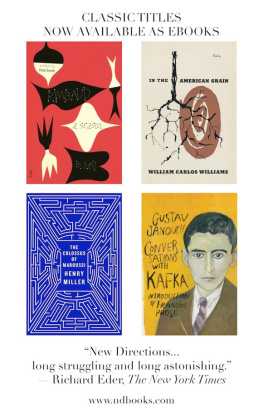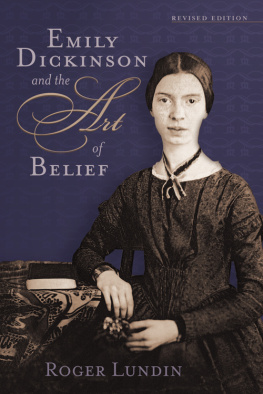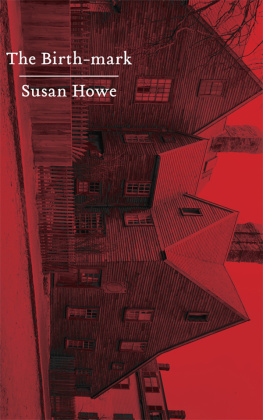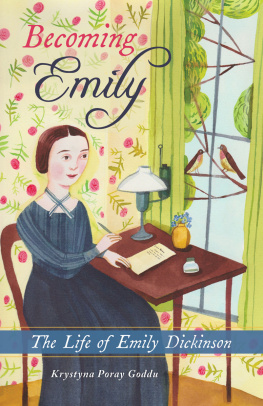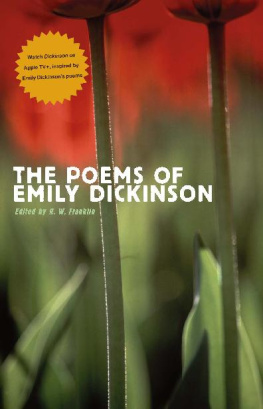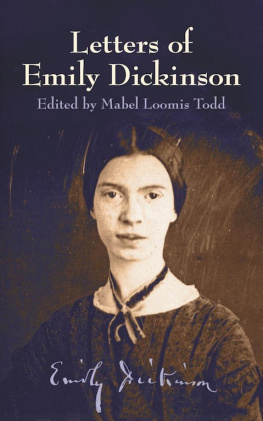PREFACE
Im Nobody! and it is indeed difficult to recuperate how much of a nobody Emily Dickinson once was. Take two classic literary histories: The 560 pages of Van Wyck Brooks The Flowering of New England (1936) mention her only twice in passing. In the 660 oversize pages of F.O. Matthiessens American Renaissance (1941), she is allotted a short paragraph: The compressed form of her poems resulted from her need to resolve conflicts, which Matthiessen does not detail. Her ideals of language, indeed her very tricks of phrase, seem indistinguishable from those of Emerson, though she does not have any of his range as a social critic. Even as late as 1980, she does not appear at all in John T. Irwins American Hieroglyphics.
D.H. Lawrence doesnt mention her in Studies in Classic American Literature (1923). Ezra Pound found room for John Greenleaf Whittier and James Whitcomb Riley in his anthology From Confucius to Cummings (1958), but did not include her. The onceimportant Georgian poet Harold Monro declared in 1925 that she is intellectually blind, partially dead, and mostly dumb to the art of poetry: Her tiny lyrics appear to be no more than the jottings of a halfidiotic schoolgirl instead of the grave musings of a full grown, fully educated woman. George Whicher, who cared enough to compile a Dickinson bibliography in 1930, stated that art forms were totally unknown to her:
Her inadvertencies and slipshod lapses have been soberly defended as beauties beyond the comprehension of the vulgar, and her name has been invoked to support the predilections of her critics for movements in verse that she could never have heard of.
In the most influential essay of the time, Allen Tate in 1932 compared her to John Donne the New Critics compared everyone to John Donne in that she perceives abstraction and thinks sensation, but writes that the difference is her ignorance, her lack of formal intellectual training. She cannot reason at all. She can only see. Even more: Her intellectual deficiency was her greatest distinction. Charles Olson refers to her only once, in an early draft of Call Me Ishmael (1947): Dickinson loved Christ but jilted Him and married Death. Her stretch and yawn for the grave strained her nature, poisoned it.
Robert Duncan writes to Denise Levertov in 1960:
Have you seen the new edition of Emily Dickinsons poems, restoring her punctuation? So that we see she was nearer akin than we might have suspected. The dashes (are spaces) articulate the line. And what a lovely measure, what an immediate thing comes out!
Levertov replies:
You know, actually those dashes bother me it seems to give a monotony of tone. I cant quite explain it. Theres something cold and perversely smug about E.D. that has always rebuffed my feeling for individual poems of hers extending itself to her work as a whole. She wrote some great things saw strangely makes one shudder with new truths but ever and again one feels (or I do) Jesus, what a bitchy little spinster.
Duncan answers: Ill not give at all on your sense of Emily Dickinson her work comes thru to me without any interfering about her personality. And, a few years later, Levertov has changed her mind at least about the dashes and reports to Duncan on an evening with Robert Lowell:
Imagine, it had never occurred to him to think of Emily Dickinsons dashes as aural notations, rests or rallentandos. He had supposed them to be merely a sort of scribbles, meaning nothing, presumably intended by E.D. to be filled in with proper punctuation later. At first in a prideful immodest way he vigorously denied they could be anything more. Eventually tho, he evidently decided to mull over this new idea.
Robert Creeley and Louis Zukofsky, though fellow masters of compression, did not write about her. (Zukofsky wanted three poems for his 1948 anthology, A Test of Poetry, but thought the permissions fee too high: $25.) Kenneth Rexroth declared that Dickinson is the equal of any woman poet of the century except Christina Rossetti and the Bronte sisters. But Lorine Niedecker who would be compared to Dickinson far too often included her among the ten writers in her immortal cupboard, and cited an 1891 letter from a prescient Alice James: It is reassuring to hear the English pronouncement that Emily Dickinson is fifthrate they have such a capacity for missing quality. Marianne Moore, in a 1933 review of the Letters, praised Dickinson in her fashion:
Dickinson has been accused of vanity. A certain buoyancy that creates an effect of inconsequent bravado a sense of drama with which we may not be quite at home was for her part of that expansion of breath necessary to existence, and unless it is conceited for the hummingbird or the osprey to not behave like a chicken, one does not find her conceited.
Others saw themselves, or what they wanted to see. Hart Crane to Gorham Munson, 1928: Some of Blakes poems and Emily Dickinsons seem more incontrovertible than ever since Relativity and a host of other ideologies, since evolved, have come into recognition. H.D. to Bryher, 1924: Really very nice crystalline stuff. Moore again, complaining of the characterization of Dickinson as a rare thing, the truly unartificial spirit: One resents the cavil that makes idiosyncrasy out of individuality. Allen Ginsberg, 1980: a fly buzzing when you died like Emily Dickinson brings you back mindful to the room where / you sit and keep breathing aware of the walls around you and the endless blue sky above your mind.
And then there is William Carlos Williams with Olson and Susan Howe herself, the most Americanist of American poets whose lines from the Jacataqua section of In the American Grain (1925) are the epigraph to this book, and against which, we learn in the first sentence, this book is written. In Williams prose, it is often difficult to know what he means, as the sentences, passionate and enthusiastic but often abstract, tend to undermine or contradict one another. Jacataqua, a simultaneous jeremiad and reverie on, among other things, the American woman, is no exception. Elsewhere in the essay he refers to Dickinson as about the only woman one can respect for her clarity.
Four years later, reviewing Kay Boyles Short Stories, he writes:
Awake, Emily Dickinson was torn apart by her passion; driven back to cover she imprisoned herself in her fathers garden, the mark of the injury she deplored, an opacity beyond which she could not penetrate. And in literature, since it is of literature that I am writing, it is the mark of our imprisonment by sleep, the continuous mark, that in estimating the work of E.D., still our writers praise her rigidity of the sleep walker the rapt gaze, the thought of Heaven and ignore the structural warping of her lines, the rhymelessness, the distress marking the place at which she turned back. She was a beginning, a trembling at the edge of waking and the terror it imposes. But she could not, and so it remains.
In 1934, in an essay on The American Background, he writes: [Emerson] was a poet, in the making, lost. His spiritual assertions were intended to be basic, but they had not and they have not today the authenticity of Emily Dickinsons unrhymes. And she was of the same school, rebelliously. (The next sentence, beginning a new paragraph, reads: It is impressive to experience the reflection of the American dearth in culture among women.) Two years later, in correspondence with the young poet Mary Barnard, he complains that Barnards poems are too delicate:
I dont ask anyone to be indelicate. That isnt it. But when a person has little actual experience of bodily contacts, when we cant get to the world hard enough or fast enough and yet we must write then we are likely to draw out a fund of material and make it do and do too often over and over and it gets hard to keep from getting brittle. Emily Dickinson (I swore I wasnt going to use her name) succeeded by hammering her form obstinately into some kind of homespun irregularity that made it do but even at her best it is too far gone to heaven too much the wish for what it might have been to be an example for many.

